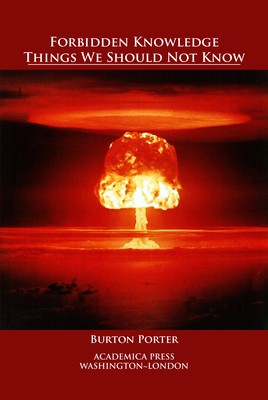
- We will send in 10–14 business days.
- Author: Burton Porter
- Publisher: Academica Press
- ISBN-10: 1680532146
- ISBN-13: 9781680532142
- Format: 15.2 x 22.9 x 1.4 cm, kieti viršeliai
- Language: English
- SAVE -10% with code: EXTRA
Reviews
Description
In this book eminent philosopher Burton Porter examines the concept of "forbidden knowledge" in religion, science, government, and psychology. From the tree of knowledge in the Garden of Eden (forbidden fruit), to world altering scientific research (nuclear power, stem-cells, cloning) to damning government secrets (Abu Ghraib, domestic spying), to traumatic experiences that individuals want to repress (sexual abuse), humanity has encountered knowledge that has been hidden and suppressed. We experience this denial as a loss of control and respect, and we want to know exactly what knowledge has been prohibited and why we cannot have access to it. Forbidden knowledge, therefore, is of enormous interest to the general public. The basic question, then, is: when, if ever, should knowledge be forbidden? Are there sacred realms that human beings are not meant to explore? Can scientific research be a Frankenstein monster, which will harm us one day? When are government secrets necessary for national security, and when does the public have a right to know? Is too much information classified? When do databanks, eavesdropping, and surveillance invade our privacy? Is self-deception justified if the truth would be psychologically disturbing? In short, can we know more than is good for us? The author takes the general position that too much material is prohibited, especially today, even while business and government invade individual privacy more and more. A primary assumption in a democracy is that we can have confidence in the people, so information should not be forbidden unless there is a vital and compelling reason to withhold it.
EXTRA 10 % discount with code: EXTRA
The promotion ends in 21d.03:52:14
The discount code is valid when purchasing from 10 €. Discounts do not stack.
- Author: Burton Porter
- Publisher: Academica Press
- ISBN-10: 1680532146
- ISBN-13: 9781680532142
- Format: 15.2 x 22.9 x 1.4 cm, kieti viršeliai
- Language: English English
In this book eminent philosopher Burton Porter examines the concept of "forbidden knowledge" in religion, science, government, and psychology. From the tree of knowledge in the Garden of Eden (forbidden fruit), to world altering scientific research (nuclear power, stem-cells, cloning) to damning government secrets (Abu Ghraib, domestic spying), to traumatic experiences that individuals want to repress (sexual abuse), humanity has encountered knowledge that has been hidden and suppressed. We experience this denial as a loss of control and respect, and we want to know exactly what knowledge has been prohibited and why we cannot have access to it. Forbidden knowledge, therefore, is of enormous interest to the general public. The basic question, then, is: when, if ever, should knowledge be forbidden? Are there sacred realms that human beings are not meant to explore? Can scientific research be a Frankenstein monster, which will harm us one day? When are government secrets necessary for national security, and when does the public have a right to know? Is too much information classified? When do databanks, eavesdropping, and surveillance invade our privacy? Is self-deception justified if the truth would be psychologically disturbing? In short, can we know more than is good for us? The author takes the general position that too much material is prohibited, especially today, even while business and government invade individual privacy more and more. A primary assumption in a democracy is that we can have confidence in the people, so information should not be forbidden unless there is a vital and compelling reason to withhold it.


Reviews